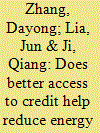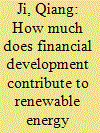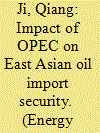|
|
|
Sort Order |
|
|
|
Items / Page
|
|
|
|
|
|
|
| Srl | Item |
| 1 |
ID:
174979


|
|
|
|
|
| Summary/Abstract |
Using firm-level data from the World Bank Enterprise Survey, this study investigates whether access to credit of a sample of Chinese manufacturing firms can affect the intensity of their energy use. Our empirical results show that firms with access to credit are associated with lower energy efficiency. In other words, firms with credit access tend to have significantly higher energy use per unit of output. This finding is robust to different measures of energy intensity and to varying specification of models. However, we find that local government environmental regulations can mitigate the financing-energy relationship: cities with stronger environmental regulations are able to reverse the relationship, in other words, firms’ access to financing is significantly associated with a reduction in their energy intensity. Our findings have important policy implications for Chinese authorities seeking more environmentally friendly development, and our conclusions suggest that energy efficiency should be considered as an additional condition for credit allocation to firms.
|
|
|
|
|
|
|
|
|
|
|
|
|
|
|
|
| 2 |
ID:
166444


|
|
|
|
|
| Summary/Abstract |
Developing renewable energy sector and upgrading energy structure have strategically important role in China's commitments against climate changes. Policymakers and authorities have put forward great efforts to make them happen. But one of the key constraints of China's energy revolution is financial issues, which is inevitably linking to the country's financial development. It is of great importance to understand how much financial development contributes to the renewable energy development in China, and more importantly what aspects of financial development matter. Through a time series analysis based on macro-level data, this paper provides clear evidence that financial development is critically important and contributes an overall of 42.42% to the variation of renewable energy growth. Specifically, we are able to demonstrate that capital market is the most important factor, followed by foreign investment. A simple comparison to the EU and the US cases indicates that the EU path is more relevant and should be studied more carefully by the Chinese policymakers.
|
|
|
|
|
|
|
|
|
|
|
|
|
|
|
|
| 3 |
ID:
163570


|
|
|
|
|
| Summary/Abstract |
East Asian countries, such as China, Japan and South Korea, are major importers in the international oil market. Therefore, oil import security is critical to sustainable economic development in these countries. This paper uses a modified two-stage DEA-like model to investigate the impact of the Organization of Petroleum Exporting Countries (OPEC) on oil import security in the East Asian region over time. Specifically, three dimensional variables were introduced to the model: the OPEC internal dimension, the OPEC and Asian country interaction dimension, and the international external dimension. The empirical results show a substantial difference between China and the other two countries in terms of these dimensions. Although the impact of OPEC on China's oil security has increased over time, its impact on Japan has declined. Political uncertainty in OPEC countries and oil price volatility are the major issues for China, whereas cost is the key area of concern for Japan. South Korea's concerns are less clear. The results of this study lay an important foundation for discussing policy issues involved in regional cooperation, integration and sustainable growth in the East Asian region.
|
|
|
|
|
|
|
|
|
|
|
|
|
|
|
|
| 4 |
ID:
149968


|
|
|
|
|
| Summary/Abstract |
This paper investigates the impact of the North American shale gas revolution on price movement regimes in the North American and European gas markets, using the Markov regime-switching model. It then measures price spreads between oil and gas from 1998 to 2015 to identify the impact of the revolution on the relationship between oil and regional gas prices. The results show that the typical movement regime of Henry Hub prices changes from 'slightly upward' to 'sharply downward'. In addition, the clear seasonal effect of Henry Hub prices has disappeared after the shale gas revolution. The typical movement of national balancing point (NBP) prices has changed gradually from a 'sharply upward' regime to the alternative regimes between 'sharply downward' and 'slightly upward', tending to follow oil prices. This indicates that the shale gas revolution has had little impact on NBP price movement. Meanwhile, Henry Hub prices have decoupled from WTI prices, while NBP and Brent prices have continued to exhibit a long-term equilibrium level around which they have swung in the short time-frame since the shale gas revolution. Pertinent energy policy makers and energy market participants should pay attention to these changes and adjust their trade, production and investment strategies accordingly.
|
|
|
|
|
|
|
|
|
|
|
|
|
|
|
|
| 5 |
ID:
132758


|
|
|
|
|
| Publication |
2014.
|
| Summary/Abstract |
This paper analyses the impact of global economic activity and international crude oil prices on natural gas import prices in three major natural gas markets using the panel cointegration model. It also investigates the shock impacts of the volatility and the increase and decrease of oil prices on regional natural gas import prices. The results show that both global economic activity and international crude oil prices have significant long-term positive effects on regional natural gas import prices. The volatility of international crude oil prices has a negative impact on regional natural gas import prices. The shock impact is weak in North America, lags in Europe and is most significant in Asia, which is mainly determined by different regional policies for price formation. In addition, the response of natural gas import prices to increases and decreases in international crude oil prices shows an asymmetrical mechanism, of which the decrease impact is relatively stronger.
|
|
|
|
|
|
|
|
|
|
|
|
|
|
|
|
|
|
|
|
|